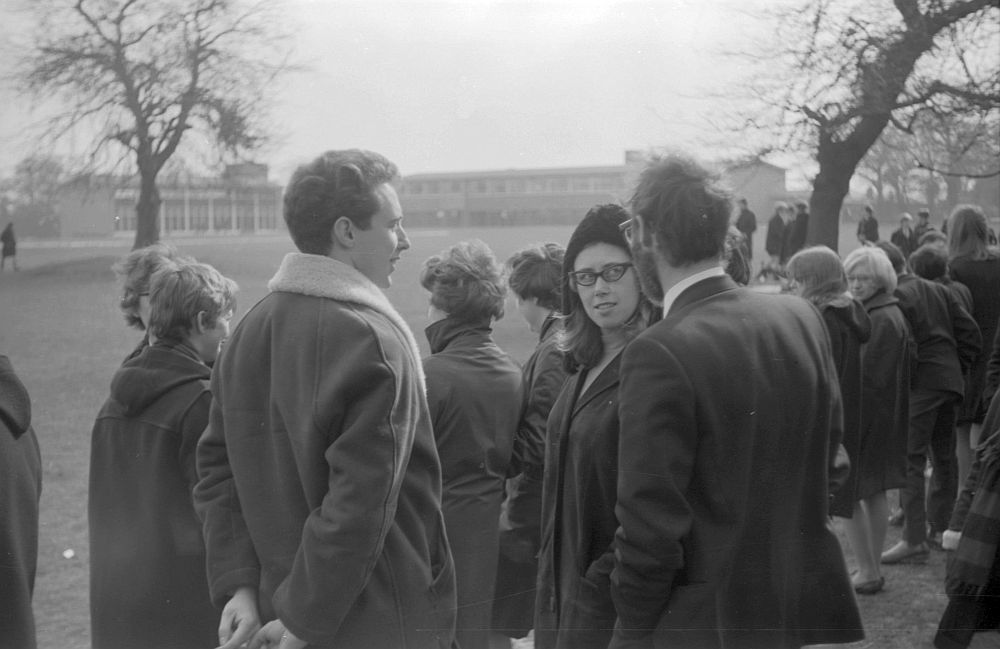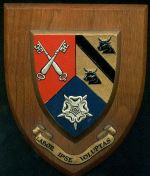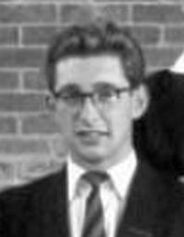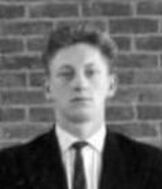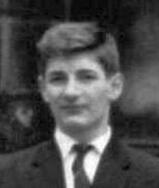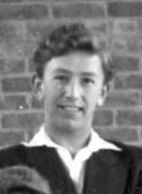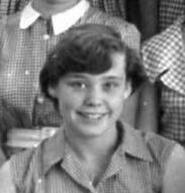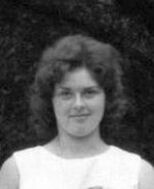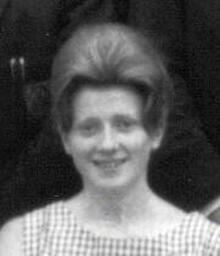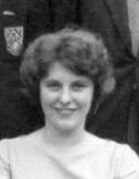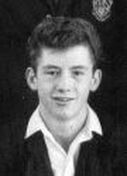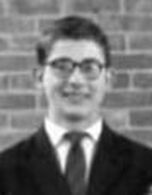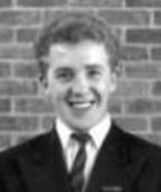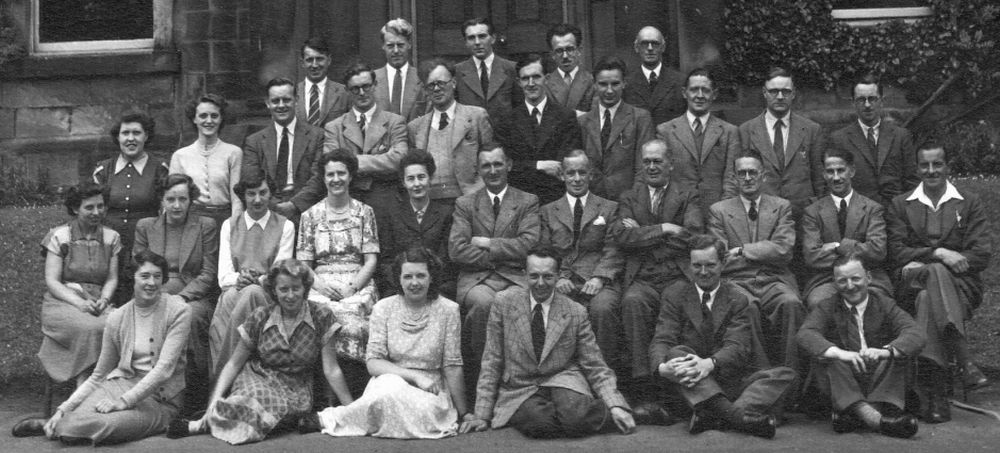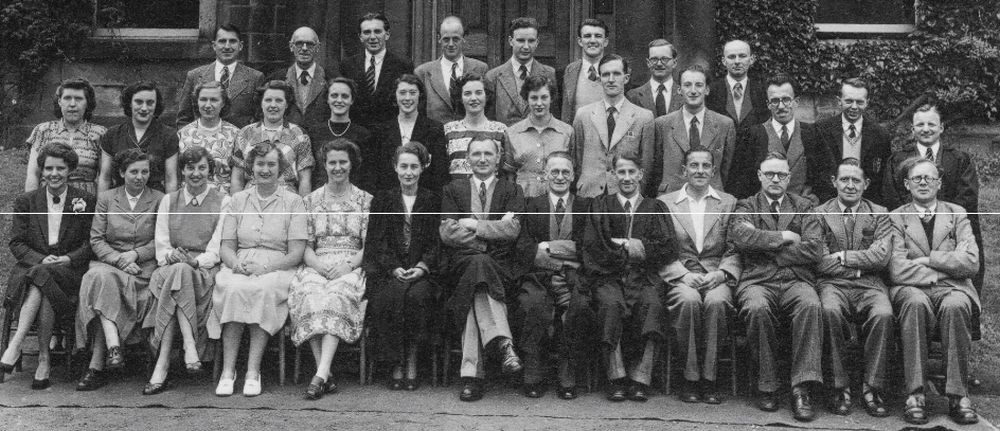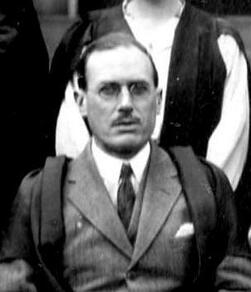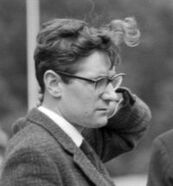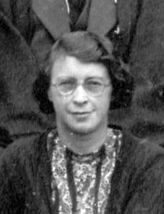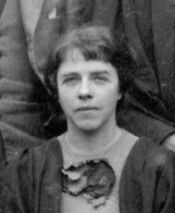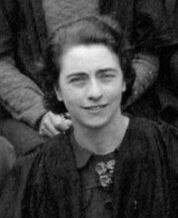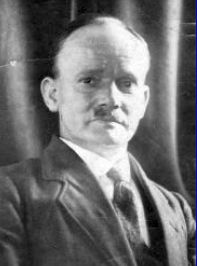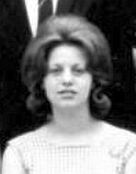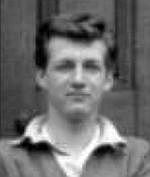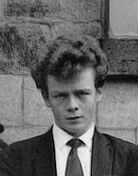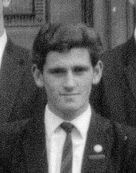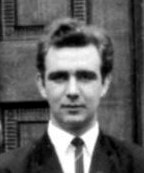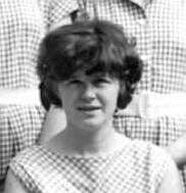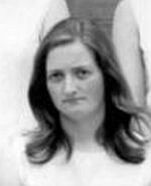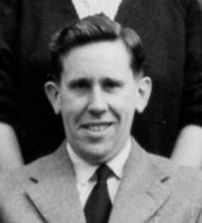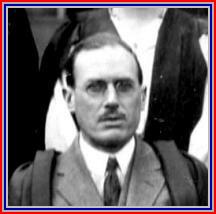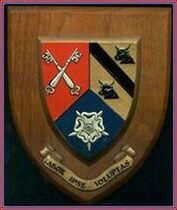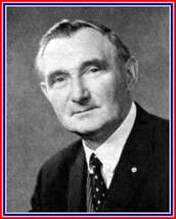Articles 1
07.02.2024
10 articles
07.02.2024
10 articles
Staff and Pupils at the Inter-House Annual Cross-country Run 1967
L-R: Mr Walsh, Miss Rankin, Mr Baker
L-R: Mr Walsh, Miss Rankin, Mr Baker
Photo: Batey
Table of Contents
These articles also appear elsewhere on this website.
These articles also appear elsewhere on this website.
|
1. 1960 "Something out of Africa"
2. 1961 "Co-existence" 3. The other side in 1950? 4. Numbers and other details from 1955 5. A Parent's Challenge 100 years ago |
6. The Moor and Mountain Club of 1966
7. Reflections on Life at Hemsworth Grammar School 8. The Purpose of Education 9. Lord Middleton's Address, Speech Day 1930 10. "Education and Peace" 1965 |
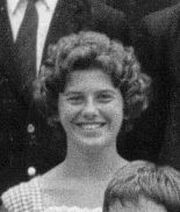
1. Council for Education in World Citizenship
1960 "Something out of Africa"
by Jean Thackray, HGS 1954-61
The eighteenth Christmas Holiday Lectures were held in Central Hall, Westminster, and this year the subject dealt with was Africa, entitled "Something out of Africa". Those from HGS who formed the party chosen to attend the conference were Gerald Ackroyd, Geoffrey Allen, Richard Bateman, John Street and Rosemary Burton, Winifred Jones and Jean Thackray. We all met at Doncaster at 10.00 a.m. and arrived in London at 1.15 p.m. The conferences did not begin until the next day and so we were free to do some sight-seeing. We were all very fortunate in our accommodation at the National Union of Students' hostel, Euston Square, where we were able to meet many other people, not only those who were attending the conference from other schools all over the country, but those living and studying in London from all over the world. Through these students we were given an insight into the way of life of countries which previously had just been shapes on a map and items in the news. We were also able to discuss our domestic problems with our fellows who had also come to London to attend the conference. Besides learning a great deal about Africa, we were also able to learn much from our social groups back at the hostel.
1960 "Something out of Africa"
by Jean Thackray, HGS 1954-61
The eighteenth Christmas Holiday Lectures were held in Central Hall, Westminster, and this year the subject dealt with was Africa, entitled "Something out of Africa". Those from HGS who formed the party chosen to attend the conference were Gerald Ackroyd, Geoffrey Allen, Richard Bateman, John Street and Rosemary Burton, Winifred Jones and Jean Thackray. We all met at Doncaster at 10.00 a.m. and arrived in London at 1.15 p.m. The conferences did not begin until the next day and so we were free to do some sight-seeing. We were all very fortunate in our accommodation at the National Union of Students' hostel, Euston Square, where we were able to meet many other people, not only those who were attending the conference from other schools all over the country, but those living and studying in London from all over the world. Through these students we were given an insight into the way of life of countries which previously had just been shapes on a map and items in the news. We were also able to discuss our domestic problems with our fellows who had also come to London to attend the conference. Besides learning a great deal about Africa, we were also able to learn much from our social groups back at the hostel.
The group's members
The conference was very fortunate this year in having the Rt. Hon. Iain Macleod, M.P. to give the opening address. Mr. Macleod encouraged us in our aim to learn and understand more about world affairs and especially about Africa, which is now undergoing a great change which will ultimately affect the whole world. He told us that although, naturally, he would be unable to attend the conferences since he was very busy involved in the very world affairs we were about to discuss, he had asked that copies of all the reports from the discussion group leaders be sent to him so that he could learn what today's youth of the country, tomorrow's leaders of the country, thought about the complex situation in Africa.
The lecturer that morning was Miss Naiski who was speaking instead of Miss Noni Jabavu who was unable to attend as planned. Her talk particularly interested me, since she concentrated rather on the human problems rather than the political ones in Africa. Miss Naiski's views were profound and sincere, and she succeeded in bringing these views, based on the truths out of Africa, very close to our hearts. She began her talk by painting for us a picture of Africa in history. Although Africa had always been thought of as extremely uncivilised, there had been a very early and great civilisation in Egypt. She mentioned where this great civilisation had penetrated even further, and described the severe hardship and cruelties forced upon her people by the earlier slavery, and now forced upon them by the present system of colonisation. Miss Naiski said that Africa still needed great help, but not the help she was receiving as a colony. Africa needs help to build a lasting democracy, and to educate her people to fulfil the needs of a democratic society. She explained that although she came from Ghana, where apartheid was practically non-existent, apartheid in the rest of Africa, especially the southern part, greatly impeded advancement along the path to a peaceful and beneficial relationship for both the native African peoples and the white Africans. She herself lived in a district where this conflict between black and white had never been apparent, but there were too many others for whom this barrier between black and white was very real. She summed up by changing the theme of her talk "The Black Man's Burden" to "The White Man's Burden", pointing out that the way to peaceful co-operation - the only way - had to be paved by the whites. They still had the powers and the means in Africa; it was for them to lay the first stone, and Africa needs them and their independence. Throughout her talk, Miss Naiski had emphasised the importance of the questions which were to come at the end, and which would give her the opportunity to talk on what particularly interested us about Africa. She hoped to clear our minds of the clouds which blurred our minds about her country. There were always too many questions at the end of the lectures for the time allowed, and many had to go unanswered.
That afternoon there was another lecture given by Mrs. Laura Grimond entitled "The White Man's Dilemma" and later the members of the conference were divided into discussion groups. We three girls were included in the cultural discussion group. These groups although valuable, were often disappointing; they were either monopolised by one person, or they were drowned by everyone speaking at once.
This was the form of the conference over the four days, i.e. two lectures in the morning, one lecture and discussion groups in the afternoon. During the remaining days the more important political aspects of the change in Africa were explored. These raised many startling and direct questions from the audience, and provided the speakers with lively topics for discussion, especially between Miss Hannah Stranton, Mr. Joshua Nkomo, President in exile, Southern Rhodesian African National Congress, M.C.L. Vambe, and Mr. Alee Dickson. The members of the audience were never afraid to put their questions frankly and bluntly to the speakers: in fact the conferences were noted for their frankness.
Many girls were unable to get tickets for the Dance at St. Pancras Town Hall, including those in the party. We remedied this disappointment by seeing as much of London as we could in four days. We saw the famous Soho and its coffee bars, and went to see three films, "The World of Suzie Wong", "Elmer Gantry", and "Never on Sundays". We had wanted to see others, but they were usually fully booked. One afternoon we took a walk through St. James' Park to Buckingham Palace, past the barracks and back through town to Westminster. The natives of London were particularly helpful in directing us where to go, and to places where we ought to go.
The sales in Oxford Street and Regent Street meant we were able to buy a few things to bring home. The benefits of this trip to London through the Conference and through our many new friendships were invaluable. As part of the youth of today, we were equipped with the knowledge we will need as tomorrow's citizens and tomorrow's leaders of the country. We will always be extremely grateful to Mr. Hudson, who organised our visit, and to the Headmaster, who enabled us to accomplish it.
Jean Thackray
The lecturer that morning was Miss Naiski who was speaking instead of Miss Noni Jabavu who was unable to attend as planned. Her talk particularly interested me, since she concentrated rather on the human problems rather than the political ones in Africa. Miss Naiski's views were profound and sincere, and she succeeded in bringing these views, based on the truths out of Africa, very close to our hearts. She began her talk by painting for us a picture of Africa in history. Although Africa had always been thought of as extremely uncivilised, there had been a very early and great civilisation in Egypt. She mentioned where this great civilisation had penetrated even further, and described the severe hardship and cruelties forced upon her people by the earlier slavery, and now forced upon them by the present system of colonisation. Miss Naiski said that Africa still needed great help, but not the help she was receiving as a colony. Africa needs help to build a lasting democracy, and to educate her people to fulfil the needs of a democratic society. She explained that although she came from Ghana, where apartheid was practically non-existent, apartheid in the rest of Africa, especially the southern part, greatly impeded advancement along the path to a peaceful and beneficial relationship for both the native African peoples and the white Africans. She herself lived in a district where this conflict between black and white had never been apparent, but there were too many others for whom this barrier between black and white was very real. She summed up by changing the theme of her talk "The Black Man's Burden" to "The White Man's Burden", pointing out that the way to peaceful co-operation - the only way - had to be paved by the whites. They still had the powers and the means in Africa; it was for them to lay the first stone, and Africa needs them and their independence. Throughout her talk, Miss Naiski had emphasised the importance of the questions which were to come at the end, and which would give her the opportunity to talk on what particularly interested us about Africa. She hoped to clear our minds of the clouds which blurred our minds about her country. There were always too many questions at the end of the lectures for the time allowed, and many had to go unanswered.
That afternoon there was another lecture given by Mrs. Laura Grimond entitled "The White Man's Dilemma" and later the members of the conference were divided into discussion groups. We three girls were included in the cultural discussion group. These groups although valuable, were often disappointing; they were either monopolised by one person, or they were drowned by everyone speaking at once.
This was the form of the conference over the four days, i.e. two lectures in the morning, one lecture and discussion groups in the afternoon. During the remaining days the more important political aspects of the change in Africa were explored. These raised many startling and direct questions from the audience, and provided the speakers with lively topics for discussion, especially between Miss Hannah Stranton, Mr. Joshua Nkomo, President in exile, Southern Rhodesian African National Congress, M.C.L. Vambe, and Mr. Alee Dickson. The members of the audience were never afraid to put their questions frankly and bluntly to the speakers: in fact the conferences were noted for their frankness.
Many girls were unable to get tickets for the Dance at St. Pancras Town Hall, including those in the party. We remedied this disappointment by seeing as much of London as we could in four days. We saw the famous Soho and its coffee bars, and went to see three films, "The World of Suzie Wong", "Elmer Gantry", and "Never on Sundays". We had wanted to see others, but they were usually fully booked. One afternoon we took a walk through St. James' Park to Buckingham Palace, past the barracks and back through town to Westminster. The natives of London were particularly helpful in directing us where to go, and to places where we ought to go.
The sales in Oxford Street and Regent Street meant we were able to buy a few things to bring home. The benefits of this trip to London through the Conference and through our many new friendships were invaluable. As part of the youth of today, we were equipped with the knowledge we will need as tomorrow's citizens and tomorrow's leaders of the country. We will always be extremely grateful to Mr. Hudson, who organised our visit, and to the Headmaster, who enabled us to accomplish it.
Jean Thackray
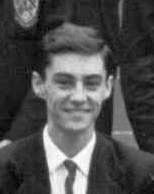
2. Council for Education in World Citizenship
1961 "Co-existence"
by Wray Vamplew, HGS 1955-62
This year Jacqueline Leonard, Marjorie Simms, Leonard Linsey, Roger Toft, Wray Vamplew and David Worgan ventured forth into the metropolis to the C.E.W.C. Conference. Experiment showed that the Circle Line brings you back to your original station, but eventually we all arrived at Central Hall, Westminster.
1961 "Co-existence"
by Wray Vamplew, HGS 1955-62
This year Jacqueline Leonard, Marjorie Simms, Leonard Linsey, Roger Toft, Wray Vamplew and David Worgan ventured forth into the metropolis to the C.E.W.C. Conference. Experiment showed that the Circle Line brings you back to your original station, but eventually we all arrived at Central Hall, Westminster.
The group's members
The topic for discussion was "Co-existence", preferably peaceful, and this was demonstrated by the communists and the advocates of moral rearmament who, despite ideological differences, made no attempt to beat each other in handing out their literature. The first speaker, Christopher Mayhew gave an entertaining definition of the Soviet conception of co-existence in which he stated that the communists falsely believed that only two forms of society, capitalist and socialist, existed. He believed that the western world was working against itself by allowing freedom of speech to communists, which Russia did not reciprocate. However, he insisted that it was not for us to withdraw our policy, but for Russia to extend hers. Like most of the speakers, Mr. Mayhew looked optimistically towards the future. Although the communists still hold the view that communism will inevitably triumph throughout the world, he pointed out that their attitude to capitalist countries has gradually lessened in severity, and that tolerance is becoming more and more evident. He thought that co-existence could succeed even if two separate blocs remained, provided both recognised the other's point of view. He attacked the communists for condemning war between countries while at the same time openly attempting to undermine the constitution of a capitalist state. However, Mr. Romanoff the Soviet Cultural Adviser, stated indirectly that this was not wrong, since the rise of the proletariat was inevitable, the communists were only accelerating the progress of the worker by encouraging civil war. Unfortunately. Mr. Romanoff seemed too concerned with putting forward propaganda than with replying to questions from the floor. A further demonstration of political evasiveness was given by Lord Gladwyn, and despite the hopes of the conference that the United Nations might become the nucleus of a true world society, one is tempted to think that while men so biased as Mr. Romanoff, and so intolerant as Lord Gladwyn represent their countries, this might prove impossible.
Other speakers included Patrick O'Donovan of "The Observer" and Miss Shirley Williams, secretary of the Fabian Society. Discussion groups were held on two afternoons and were divided into four sections: political, economic, social and cultural. I found it impossible to be sure that peaceful co-existence would continue under present conditions, but the futility of nuclear war was generally accepted and hopes of changes in government attitudes were widespread.
On the less serious side, a dance was held at Chelsea Town Hall and a concert of international music and dancing was also arranged. Our week provided entertainment so diverse as to include a visit to the British Museum and an evening at a jazz cellar. Thanks go to Mr. Hudson for arranging our visit, and to the Headmaster for allowing it. I would recommend anyone who has the opportunity of attending in future to do so.
Wray Vamplew, U6S
Other speakers included Patrick O'Donovan of "The Observer" and Miss Shirley Williams, secretary of the Fabian Society. Discussion groups were held on two afternoons and were divided into four sections: political, economic, social and cultural. I found it impossible to be sure that peaceful co-existence would continue under present conditions, but the futility of nuclear war was generally accepted and hopes of changes in government attitudes were widespread.
On the less serious side, a dance was held at Chelsea Town Hall and a concert of international music and dancing was also arranged. Our week provided entertainment so diverse as to include a visit to the British Museum and an evening at a jazz cellar. Thanks go to Mr. Hudson for arranging our visit, and to the Headmaster for allowing it. I would recommend anyone who has the opportunity of attending in future to do so.
Wray Vamplew, U6S
3. The other side of HGS in 1950?
I found this article interesting, not necessarily the content, but for other considerations. Were these interviews on an individual basis, or were the parents all invited to attend this particular meeting of the Governors? Reading other reports it is clear that this was a pet ‘beef’ of Mr. Hamilton - children wishing to leave early. We as pupils, never realised it was a problem. To go to such lengths as to call parents to interview, in public, so to speak, seems a strong measure. I’m also surprised that these parents attended. I can understand them being interviewed by R.W.H. in private, in his office. I also never realised the Governors were in a position to prevent children leaving school at 15.
Geoff Govier
Geoff Govier
HGS Staff 1949-50
Back Row L-R: Mr. Allan, 2, Mr. Taylor, Mr. Walker, Mr. Lock
Third Row L-R: Miss. Ward, Miss. Woodward, Mr. Jones, Mr. Stockhill, Mr. Lloyd, Mr. Farrar, Mr. Owen, Mr. Foy, Mr. Atack, Mr. Johnson
Second Row L-R: Miss. Metcalfe, Mrs. Burns, Miss. Whitworth, Miss. Harris, Miss. Smith, Mr. Hamilton, Mr. Crossland, Mr. Storer, Mr. Collette, Mr. Manning, Mr. Leonard
Front Row L-R: Miss. Saville, Miss. Jackson, Miss. Wimpenny, Mr. Burnett, Mr. Combs, Mr. Swinbank
Third Row L-R: Miss. Ward, Miss. Woodward, Mr. Jones, Mr. Stockhill, Mr. Lloyd, Mr. Farrar, Mr. Owen, Mr. Foy, Mr. Atack, Mr. Johnson
Second Row L-R: Miss. Metcalfe, Mrs. Burns, Miss. Whitworth, Miss. Harris, Miss. Smith, Mr. Hamilton, Mr. Crossland, Mr. Storer, Mr. Collette, Mr. Manning, Mr. Leonard
Front Row L-R: Miss. Saville, Miss. Jackson, Miss. Wimpenny, Mr. Burnett, Mr. Combs, Mr. Swinbank
HGS Staff 1950-51
Back Row L-R: Mr. Allan, Mr. Lock, Mr. Taylor, Mr. Senior, Mr. Owen, Mr. Dodd, Mr. Combs, Mr. Revill
Second Row L-R: Miss. Ward, Miss. Austin, Miss. Corfe, Miss. Wimpenny, Mrs. Owen, Miss. Saville, Miss. McBride, Sheila Close (Sec.), Mr. Farrar, Mr. Young, Mr. Walker, Mr. Burnett, Mr. Swinbank
Front Row L-R: Miss. Horsfield, Miss. Metcalfe, Miss. Whitworth, Miss. Carter, Miss. Harris, Miss. Smith, Mr. Hamilton, Mr. Collette, Mr. Manning, Mr. Leonard, Mr. Atack, Mr. Foy, Mr. Lloyd
Second Row L-R: Miss. Ward, Miss. Austin, Miss. Corfe, Miss. Wimpenny, Mrs. Owen, Miss. Saville, Miss. McBride, Sheila Close (Sec.), Mr. Farrar, Mr. Young, Mr. Walker, Mr. Burnett, Mr. Swinbank
Front Row L-R: Miss. Horsfield, Miss. Metcalfe, Miss. Whitworth, Miss. Carter, Miss. Harris, Miss. Smith, Mr. Hamilton, Mr. Collette, Mr. Manning, Mr. Leonard, Mr. Atack, Mr. Foy, Mr. Lloyd
After interviewing the parents of seven pupils, Governors of Hemsworth Grammar School on Friday refused their applications for the children to leave school at the age of 15. The chairman of the Governors told the parents that they ought to think of their children’s after-school life. Education gave them a better opportunity of facing the world. The better their education the more good they could do for the nation.
Specific examples:
a. A father told the Governors that his lad was determined to leave school when he was 15. “He is absolutely fed up with school”, he said, “and has lost all interest in it since he went to Leeds Infirmary for an operation on his eyes.” Asked what plans he had for the boy when he left school, the father said he had no idea what work the lad would take up, but he wanted to join the R.A.F. The Divisional Education Officer remarked that the best thing he could do before joining the R.A.F. was to take his School Certificate.
b. A mother said her daughter was “fed up” with school and wanted to leave. “I have had four children at the Grammar School,” she added, “and they are doing now what a girl could do who had been to an ordinary school. My daughter wants to leave to take up work as a nursery help.” The Education Officer pointed out that there would not be any chance of a girl getting a nursery assistant’s job for the next seven months. “We have far more than we ought to have, and they are going to be reduced.” he added. The Chairman asked the mother to give the matter serious consideration, but the parent said she had done so. “To keep four children at the Grammar School has not been a picnic.” she declared. As a parent of six children she said she could not afford to keep her daughter at school.
c. Another mother remarked: “I have been working three or four years and am going to pack it up. My girl can start work.” Asked what sort of job she would get, the mother replied: “There are factories. It isn’t my idea that she should leave but money is tight.”
d. Another mother told the Governors that she wanted her daughter to help her at home. The girl was not taking any interest in the school. The Education Officer said he could quote hundreds of examples where parents had made sacrifices to keep their children at school. Every parent had a moral obligation to keep their children at school until they were 16.
e. A father said that because of his health he could not afford to keep his son at the school. Another Governor asked if that were not a case where some assistance could be given, and the chairman replied that it all depended upon the family’s income. The Governor said “If you could get a suitable grant would you try to keep the boy at school?” The father: “No, I have got a good job for him in a colliery office.”
f. A father said that his daughter wanted to leave at the end of the Easter term. She had lost a lot of interest in the school and wanted to help with the household expenses. The girl had been absent several times owing to illness and was afraid that because of that she would not be able to sit for her School Certificate. She wanted to work in a shop. The father added that he had told her he wished he had had the same chance when he was her age.
Specific examples:
a. A father told the Governors that his lad was determined to leave school when he was 15. “He is absolutely fed up with school”, he said, “and has lost all interest in it since he went to Leeds Infirmary for an operation on his eyes.” Asked what plans he had for the boy when he left school, the father said he had no idea what work the lad would take up, but he wanted to join the R.A.F. The Divisional Education Officer remarked that the best thing he could do before joining the R.A.F. was to take his School Certificate.
b. A mother said her daughter was “fed up” with school and wanted to leave. “I have had four children at the Grammar School,” she added, “and they are doing now what a girl could do who had been to an ordinary school. My daughter wants to leave to take up work as a nursery help.” The Education Officer pointed out that there would not be any chance of a girl getting a nursery assistant’s job for the next seven months. “We have far more than we ought to have, and they are going to be reduced.” he added. The Chairman asked the mother to give the matter serious consideration, but the parent said she had done so. “To keep four children at the Grammar School has not been a picnic.” she declared. As a parent of six children she said she could not afford to keep her daughter at school.
c. Another mother remarked: “I have been working three or four years and am going to pack it up. My girl can start work.” Asked what sort of job she would get, the mother replied: “There are factories. It isn’t my idea that she should leave but money is tight.”
d. Another mother told the Governors that she wanted her daughter to help her at home. The girl was not taking any interest in the school. The Education Officer said he could quote hundreds of examples where parents had made sacrifices to keep their children at school. Every parent had a moral obligation to keep their children at school until they were 16.
e. A father said that because of his health he could not afford to keep his son at the school. Another Governor asked if that were not a case where some assistance could be given, and the chairman replied that it all depended upon the family’s income. The Governor said “If you could get a suitable grant would you try to keep the boy at school?” The father: “No, I have got a good job for him in a colliery office.”
f. A father said that his daughter wanted to leave at the end of the Easter term. She had lost a lot of interest in the school and wanted to help with the household expenses. The girl had been absent several times owing to illness and was afraid that because of that she would not be able to sit for her School Certificate. She wanted to work in a shop. The father added that he had told her he wished he had had the same chance when he was her age.
The Chairman of the Governors said the parents were responsible for the children until they were 21. If the children were going to tell their parents what they were going to do when they were 15, it would be a bad outlook for the nation. Another Governor said they should not allow the parents to leave without impressing upon them the fact that the Governors took a serious view of the matter. “If you have a promising child in your family, it isn’t sufficient for you to say that it should go and earn money,” he added. “These brilliant brains will be lost if you let the child have its own way. A child should be of some use to the community. It would be a tragedy if these children were to leave at present, and I appeal to you to allow them to have this chance in life. The Governors have no right to let the children go and the parents have even less right to say that they shall go.” The parents left the meeting after having been asked by the Chairman to think seriously before taking action, and later in the evening when the discussion was resumed, a Governor remarked: “Isn’t it a case of the children bringing up the parents.”
Another Governor suggested that before children were admitted to the School, parents should be asked to agree that they would take the School Certificate. The Chairman of the Governors agreed that they ought to have some undertaking. If parents intended that their children should leave when they were 15, they should go to a Modern School. Mr. R. W. Hamilton, Headmaster, said he had already been notified of 11 children who wanted to leave when they were 15 and there were more to come. A large number of children didn’t like school when they reached the age of 15. “They see their pals from the Modern Schools getting jobs and know that they get pocket money,” he said. “They wouldn’t mind coming to school from 9.00 a.m. to 4.00 p.m. if they had nothing more to do and could go to a dance or the pictures or listen to the radio.”
Another Governor suggested that before children were admitted to the School, parents should be asked to agree that they would take the School Certificate. The Chairman of the Governors agreed that they ought to have some undertaking. If parents intended that their children should leave when they were 15, they should go to a Modern School. Mr. R. W. Hamilton, Headmaster, said he had already been notified of 11 children who wanted to leave when they were 15 and there were more to come. A large number of children didn’t like school when they reached the age of 15. “They see their pals from the Modern Schools getting jobs and know that they get pocket money,” he said. “They wouldn’t mind coming to school from 9.00 a.m. to 4.00 p.m. if they had nothing more to do and could go to a dance or the pictures or listen to the radio.”
4. Numbers and other details from 1955
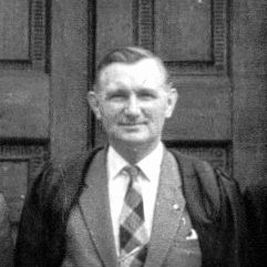
The 34th annual Speech Day of Hemsworth Grammar School was held on Wednesday 9th November 1955. The headmaster, Mr. R. W. Hamilton, said that in September 1954, the number of pupils in the school was 660, and last September it was 674. "Our numbers continue to increase each September, but so does the number of pupils who leave before completing the course," he added.
By the end of the school year last July, 141 pupils - 64 boys and 77 girls - had left. Of that number 14 had taken examinations at the "A" level, 63 at "0" level, and 64 left before they had time to reach the standard of the General Certificate of Education. Of those who took the G. C. E. at "0" level, 28 stayed on to enter the sixth form, but eight of those would leave halfway through the two year course. Careers taken up by the leavers were: to university, training college, and further education, 24; transferred to other schools, or left the district, 25; to the N.C.B, to industry and miscellaneous employment, 21; nursing, 4; laboratory technicians, 1; police, 1: clerks, shop assistants, factories (all girls), 23; Forces (boys), 2; no information whatsoever, 40.
Referring to examination results, Mr. Hamilton said that in the G.C.E. at advanced level, 15 boys and 4 girls between them presented 46 papers in 10 different subjects, and 36 of the entries were successful. "Generally speaking, the standard of our "A" level was somewhat disappointing," Mr. Hamilton added. "There is too strong a tendency on the part of the candidates to concentrate on those subjects they like best. This may be a human failing, but common sense ought to indicate that concentration on the weakest, and therefore usually the least liked subject, is the better way to ensure good progress."
The standard of work was satisfactory, but outstanding performances were not numerous. Only three scholarships were won - a State Scholarship, an Open Scholarship in Mathematics at Hull University, and a County Exhibition. "Whilst congratulating the winners, I feel there ought to have been a somewhat higher return for our efforts, and we hope that the present sixth forms, both upper and lower, will take note," said Mr. Hamilton. At the ordinary level, results were more satisfactory. There were 91 entrants with 366 passes between them - about four per pupil. That was better than their 1954 record, but it was a little disappointing at that stage leaving the school for good. "With 675 pupils in September 1955, a sixth form of 60 pupils is too small," he added.
Turning to school activities, Mr. Hamilton said they now ran five rugby teams which made it possible for about 80 boys to play for their school in any one season. Such a programme made heavy demands on the time of the staff, and it also cost the education Committee a little more on travelling expenses, but he thought the benefit to the boys justified the effort, time and money.
By the end of the school year last July, 141 pupils - 64 boys and 77 girls - had left. Of that number 14 had taken examinations at the "A" level, 63 at "0" level, and 64 left before they had time to reach the standard of the General Certificate of Education. Of those who took the G. C. E. at "0" level, 28 stayed on to enter the sixth form, but eight of those would leave halfway through the two year course. Careers taken up by the leavers were: to university, training college, and further education, 24; transferred to other schools, or left the district, 25; to the N.C.B, to industry and miscellaneous employment, 21; nursing, 4; laboratory technicians, 1; police, 1: clerks, shop assistants, factories (all girls), 23; Forces (boys), 2; no information whatsoever, 40.
Referring to examination results, Mr. Hamilton said that in the G.C.E. at advanced level, 15 boys and 4 girls between them presented 46 papers in 10 different subjects, and 36 of the entries were successful. "Generally speaking, the standard of our "A" level was somewhat disappointing," Mr. Hamilton added. "There is too strong a tendency on the part of the candidates to concentrate on those subjects they like best. This may be a human failing, but common sense ought to indicate that concentration on the weakest, and therefore usually the least liked subject, is the better way to ensure good progress."
The standard of work was satisfactory, but outstanding performances were not numerous. Only three scholarships were won - a State Scholarship, an Open Scholarship in Mathematics at Hull University, and a County Exhibition. "Whilst congratulating the winners, I feel there ought to have been a somewhat higher return for our efforts, and we hope that the present sixth forms, both upper and lower, will take note," said Mr. Hamilton. At the ordinary level, results were more satisfactory. There were 91 entrants with 366 passes between them - about four per pupil. That was better than their 1954 record, but it was a little disappointing at that stage leaving the school for good. "With 675 pupils in September 1955, a sixth form of 60 pupils is too small," he added.
Turning to school activities, Mr. Hamilton said they now ran five rugby teams which made it possible for about 80 boys to play for their school in any one season. Such a programme made heavy demands on the time of the staff, and it also cost the education Committee a little more on travelling expenses, but he thought the benefit to the boys justified the effort, time and money.
5. A Parent's Challenge 100 years ago
Mr Jenkinson, the first headmaster of Hemsworth Secondary/Grammar School.
As previously mentioned, when the school was first opened it was decided, in the light of previous experience, to require the parents of pupils to sign a document undertaking to allow their children to remain at the school until the end of the term in which the child was 16 years old. It was thought best to be reassured that if any child received a grant towards attendance at the school, the Governors should have some official commitment from the parent that the child would complete his or her education, and not leave at the age of 14, as was often the case. The parents of one of the prospective new pupils of September 1923 had duly received such a letter, inviting an assurance of the attendance of their child for the full period. His (or her) reply must have caused a stir! It was published in a local newspaper.
Dear Sir,
I wish to point out the following,
1. It is not my intention to sign any form of agreement which in my opinion would be prejudicial to the best interest of our child (or children).
2. I consider that the terms laid down in your form of agreement place a premium on parents' efforts to educate their children to the best advantage in the children's own interests. That means to say that if a parent is not prepared to sign an agreement to send the child to your Secondary School until she (or he) attains the age of 16, that child is prevented from having a Secondary Education from the age of 10 to the age of 14.
3. That I have not the slightest intention whatsoever of meeting the Governors of your Secondary School to discuss whether or not I shall be bound to pay to the Governors of Hemsworth Secondary School the sum of "Nine Guineas" if I desire to withdraw my child from the school before she attains the age of 16.
4. What I am prepared to do is pay a term's fee in advance and if the tuition given is satisfactory, and the pupil is making reasonable progress, then there is no reason why the child should not remain at the school if it is the parent's wish, but if the parent's desire to withdraw the child from the school at the end of any term, they may do so.
5. That your agreement is all on one side, that of "THE GOVERNORS". The parents (if he or she has signed the agreement) have no further say in the matter only by paying the NINE GUINEAS. FUDGE!
6. The great motto of the Penistone Grammar School is "LEARN or LEAVE". The great motto of the Hemsworth Secondary School is, "PAY UP AND LOOK PLEASANT", and if circumstances (over which you have no control) change, and you cannot afford to send your child to the Hemsworth Secondary School, you may, by making application to the Governors of the School, tell them all your circumstances, then they will tell you whether or not you can afford to pay NINE GUINEAS, as they are the deciding factor.
Ald. Gabriel Price's reaction to this as Chairman of the Governors was to repeat that it was the duty of all Governors throughout the County to ensure that the parents signed the Forms, but he quite understood any reluctance to do so if the Forms were worded in a complicated way or phrased in an overly-formal manner. Any parent who wanted to transfer a child from one school to another was at liberty so to do. There would be no difficulty in a child's leaving the school if the parents were leaving the district; however, it was his opinion that if a child was going to be fully educated at the School, it was imperative that the Agreement should be signed. He promised to see the writer of the letter, together with other parents who had refused to sign the agreement or wished to withdraw their children.
It seems clear that this policy was experiencing difficulties at this time. The writer of the letter does not seem to be the only objector. The Agreement Form was probably established with the best of intentions, and it would be interesting to see how long it continued to exist.
Dear Sir,
I wish to point out the following,
1. It is not my intention to sign any form of agreement which in my opinion would be prejudicial to the best interest of our child (or children).
2. I consider that the terms laid down in your form of agreement place a premium on parents' efforts to educate their children to the best advantage in the children's own interests. That means to say that if a parent is not prepared to sign an agreement to send the child to your Secondary School until she (or he) attains the age of 16, that child is prevented from having a Secondary Education from the age of 10 to the age of 14.
3. That I have not the slightest intention whatsoever of meeting the Governors of your Secondary School to discuss whether or not I shall be bound to pay to the Governors of Hemsworth Secondary School the sum of "Nine Guineas" if I desire to withdraw my child from the school before she attains the age of 16.
4. What I am prepared to do is pay a term's fee in advance and if the tuition given is satisfactory, and the pupil is making reasonable progress, then there is no reason why the child should not remain at the school if it is the parent's wish, but if the parent's desire to withdraw the child from the school at the end of any term, they may do so.
5. That your agreement is all on one side, that of "THE GOVERNORS". The parents (if he or she has signed the agreement) have no further say in the matter only by paying the NINE GUINEAS. FUDGE!
6. The great motto of the Penistone Grammar School is "LEARN or LEAVE". The great motto of the Hemsworth Secondary School is, "PAY UP AND LOOK PLEASANT", and if circumstances (over which you have no control) change, and you cannot afford to send your child to the Hemsworth Secondary School, you may, by making application to the Governors of the School, tell them all your circumstances, then they will tell you whether or not you can afford to pay NINE GUINEAS, as they are the deciding factor.
Ald. Gabriel Price's reaction to this as Chairman of the Governors was to repeat that it was the duty of all Governors throughout the County to ensure that the parents signed the Forms, but he quite understood any reluctance to do so if the Forms were worded in a complicated way or phrased in an overly-formal manner. Any parent who wanted to transfer a child from one school to another was at liberty so to do. There would be no difficulty in a child's leaving the school if the parents were leaving the district; however, it was his opinion that if a child was going to be fully educated at the School, it was imperative that the Agreement should be signed. He promised to see the writer of the letter, together with other parents who had refused to sign the agreement or wished to withdraw their children.
It seems clear that this policy was experiencing difficulties at this time. The writer of the letter does not seem to be the only objector. The Agreement Form was probably established with the best of intentions, and it would be interesting to see how long it continued to exist.
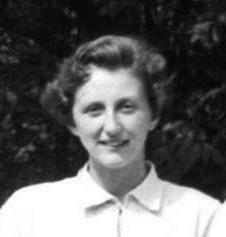
Sheila
6. The Moor and Mountain Club of 1966
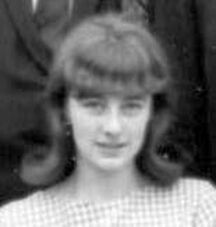
This year saw the beginning of a new club dedicated to outdoor pursuits; something this school has previously lacked. Despite the fact that the membership is limited to the senior forms of the school - and that a small fee is charged, there has been a promising start and membership now totals over 120. The club's aim is eventually to arrange facilities for all outside hobbies and it is hoped to increase the funds so that the school can have its own supply of equipment and maps. Thanks must go to Mr. Bavister who has given much of his time to organising the club. At the end of last summer term he ran a census to determine the demand for such a club and after a successful, if not uneventful, camping and trekking holiday in Arran with a party of boys, decided to make the scheme a reality.
Mr Bavister
The first outing arranged was a youth hostel house party during the October half-term to Ingleton led by Mr. Bavister with his fiancée and Mlle. Passols. This was very much an experimental holiday to see how various ideas worked in practice. We were based at the youth hostel but did most of our own cooking which proved rather amusing as the kitchen was small and our number - 28, rather large. During the day we had the choice of accompanying Mr. Bavister and the staff, or going in groups as long as he approved the route.
The first day we climbed to the summit of Ingleborough. Later in the day, some of the more adventurous of us briefly explored Douk cave wading in the stream bed with water well above our knees to do so. The second day a walk was arranged around the picturesque waterfall walk by Thornton Force and it gave the chance for some rock scrambling and swimming for those who were brave enough to enter the water at that time of year. Other places visited by some members of the party included Clapham Cave, Trow Gill and Gaping Gill, Whernside and White Scar Caves. The experiment proved very successful and two further ventures have been planned, the first to Moffat at Whitsuntide. This will be a camping and trekking holiday in the Tweedsmuir and Lowther hills. Surprisingly no girls were interested in this but the second venture to Chepstow in the summer was more in demand. In contrast this is a youth hostel house party and activities will include walking in the Forest of Dean and nearby Black Mountains and swimming at the coast.
The main activity of the club throughout the year has been the training for the Duke of Edinburgh Award Scheme. This began in January and was limited to fourth formers studying for their Bronze award. The response was far larger than expected: 31 boys and 14 girls. The course includes an expedition - some of which have already been accomplished in the Pennines - a hobby or pursuit, homecraft for girls, physical fitness for boys, and an aspect of social service, the one chosen being First Aid. The hobbies are varied, ranging from mountain craft, stamps and music to natural science and photography, and many of the staff have helped with these. There has also been a large demand from the older members of the club for introduction of the Silver and Gold schemes and it is hoped that this might be arranged in the future.
The club as a whole meets to discuss the various ventures suggested and there have been two lectures on mountain safety one by Mr. Bavister and one by Mr. W. Keay a lecturer from Bingley Training College. As a whole the club has had a very successful and encouraging first year and it is hoped that it will continue to expand and perhaps include some of the more adventurous ideas such as building and then sailing our own canoes.
Margaret Beaumont. U.6.S. Price
The first day we climbed to the summit of Ingleborough. Later in the day, some of the more adventurous of us briefly explored Douk cave wading in the stream bed with water well above our knees to do so. The second day a walk was arranged around the picturesque waterfall walk by Thornton Force and it gave the chance for some rock scrambling and swimming for those who were brave enough to enter the water at that time of year. Other places visited by some members of the party included Clapham Cave, Trow Gill and Gaping Gill, Whernside and White Scar Caves. The experiment proved very successful and two further ventures have been planned, the first to Moffat at Whitsuntide. This will be a camping and trekking holiday in the Tweedsmuir and Lowther hills. Surprisingly no girls were interested in this but the second venture to Chepstow in the summer was more in demand. In contrast this is a youth hostel house party and activities will include walking in the Forest of Dean and nearby Black Mountains and swimming at the coast.
The main activity of the club throughout the year has been the training for the Duke of Edinburgh Award Scheme. This began in January and was limited to fourth formers studying for their Bronze award. The response was far larger than expected: 31 boys and 14 girls. The course includes an expedition - some of which have already been accomplished in the Pennines - a hobby or pursuit, homecraft for girls, physical fitness for boys, and an aspect of social service, the one chosen being First Aid. The hobbies are varied, ranging from mountain craft, stamps and music to natural science and photography, and many of the staff have helped with these. There has also been a large demand from the older members of the club for introduction of the Silver and Gold schemes and it is hoped that this might be arranged in the future.
The club as a whole meets to discuss the various ventures suggested and there have been two lectures on mountain safety one by Mr. Bavister and one by Mr. W. Keay a lecturer from Bingley Training College. As a whole the club has had a very successful and encouraging first year and it is hoped that it will continue to expand and perhaps include some of the more adventurous ideas such as building and then sailing our own canoes.
Margaret Beaumont. U.6.S. Price
7. Reflections on Life at Hemsworth Grammar School
Here is an article to which we can possibly relate. It has been visited and commented upon many time since it first appeared on the website.
Dave
Dave
I always think that my Grammar School life actually began on the morning that our Junior School Headmaster read out the names of those of us who had passed the Scholarship. I literally wept for joy and then, having been given permission because of the occasion, sped home to announce the good news. For the next few weeks I walked on air. There might never before have been a gymslip bought, a School bag polished, a ‘bus pass issued.
The great day arrived and I came down to earth with a most awful bump. I felt very small and insignificant standing there in the School Hall. The Prefects looked so tall and reserved; the Staff so remote and stern in their gowns; the gilt lettering round the panelling so formidable and so completely strange. I thought that I would never get used to this School. How I longed for the little School from which I had come. The first day was one mad frightening rush – attempting to find classrooms; learning names; getting dinner tickets (this was always a nightmare to me, as I was always afraid of being left without dinner). Time went on, and of course I did get used to it eventually. School life became quite a routine, with all the odd incidents standing out in my memory.
Funny isn’t it, how all the seemingly unimportant things are remembered best. The first winter was a very severe one – lots of snow and frost and fog. Near our ‘bus stop was a pond where we all used to congregate for a session of sliding before the ‘bus arrived to take us to our hive of industry. One morning, after a severe frost, excitement having quite gone to my head, I ventured on to some thin ice and before I knew what happened I fell in, new gymslip and all. I trailed miserably home to change and for weeks afterwards was tormented with a lot of sarcastic remarks. Talking of frost reminds me of another mild form of torture which I went through that winter. We were learning French phonetics and the effort of saying “a”, “e”, “i” etc. with chapped lips stretched to cracking point was something which has to be experienced before it can be believed.
The Osiris players came to School that winter – it was the first time I had seen anything so wonderful. I sat through the show open-mouthed and developed a great admiration for those women which has not abated in the least. I think that those shows, together with the School plays, were the brightest spots in my School life. My dearest ambition after seeing “She Stoops to Conquer” was to act in a School play and wear a crinoline and a curly wig (I had short, straight hair). This I never managed and so I still nurse in my bosom a burning desire to sweep majestically around in a gorgeous hooped gown.
In the 2nd Form I attended my first film show in the Art room with my first boy friend. We sat on one of the sinks at the back of the room eating toffees and holding sticky, ink-stained hands. I thought it all quite wonderful, and so it was until Mr Hamilton came along to us and started a discussion on costumes through the ages. I never forgave him for that!
My first contribution to the School Magazine was made whilst I was in the 2nd Form. It was a short, despairing protest (I had been encouraged in this by my Form master) against the commandeering of the cloakroom mirrors by the senior girls. It brought down on my head a torrent of abuse and I vowed that I would never again write anything for the magazine.
In my 3rd year I joined the Choir and was sure that because of that we won the 1st place in the Pontefract Musical Festival. I can remember nothing about that day – music, adjudication, songs or anything, except the fact that Miss Townsend bought a great bag of toffees and handed them round in the ‘bus. (Stomach again.)
The great day arrived and I came down to earth with a most awful bump. I felt very small and insignificant standing there in the School Hall. The Prefects looked so tall and reserved; the Staff so remote and stern in their gowns; the gilt lettering round the panelling so formidable and so completely strange. I thought that I would never get used to this School. How I longed for the little School from which I had come. The first day was one mad frightening rush – attempting to find classrooms; learning names; getting dinner tickets (this was always a nightmare to me, as I was always afraid of being left without dinner). Time went on, and of course I did get used to it eventually. School life became quite a routine, with all the odd incidents standing out in my memory.
Funny isn’t it, how all the seemingly unimportant things are remembered best. The first winter was a very severe one – lots of snow and frost and fog. Near our ‘bus stop was a pond where we all used to congregate for a session of sliding before the ‘bus arrived to take us to our hive of industry. One morning, after a severe frost, excitement having quite gone to my head, I ventured on to some thin ice and before I knew what happened I fell in, new gymslip and all. I trailed miserably home to change and for weeks afterwards was tormented with a lot of sarcastic remarks. Talking of frost reminds me of another mild form of torture which I went through that winter. We were learning French phonetics and the effort of saying “a”, “e”, “i” etc. with chapped lips stretched to cracking point was something which has to be experienced before it can be believed.
The Osiris players came to School that winter – it was the first time I had seen anything so wonderful. I sat through the show open-mouthed and developed a great admiration for those women which has not abated in the least. I think that those shows, together with the School plays, were the brightest spots in my School life. My dearest ambition after seeing “She Stoops to Conquer” was to act in a School play and wear a crinoline and a curly wig (I had short, straight hair). This I never managed and so I still nurse in my bosom a burning desire to sweep majestically around in a gorgeous hooped gown.
In the 2nd Form I attended my first film show in the Art room with my first boy friend. We sat on one of the sinks at the back of the room eating toffees and holding sticky, ink-stained hands. I thought it all quite wonderful, and so it was until Mr Hamilton came along to us and started a discussion on costumes through the ages. I never forgave him for that!
My first contribution to the School Magazine was made whilst I was in the 2nd Form. It was a short, despairing protest (I had been encouraged in this by my Form master) against the commandeering of the cloakroom mirrors by the senior girls. It brought down on my head a torrent of abuse and I vowed that I would never again write anything for the magazine.
In my 3rd year I joined the Choir and was sure that because of that we won the 1st place in the Pontefract Musical Festival. I can remember nothing about that day – music, adjudication, songs or anything, except the fact that Miss Townsend bought a great bag of toffees and handed them round in the ‘bus. (Stomach again.)
|
Miss Townsend
Music |
Miss Shortridge
Senior Mistress |
Miss Kenward
Science |
The work we did at School, the examinations, the homework we did or did not do, are all quite hazy now, but the little, silly things are still fresh in my mind such as: forgetting my magazine money after a final warning and being reduced to a dithering idiot by the cutting remarks of the English teacher; sliding down the corridor and falling right at Miss Shortridge’s feet as she came round the corner; seeing Miss Kenward faint in the Staff Play and wondering how she did it without hurting herself; hating the doctor’s periodic visits; acting behind the footlights for the first time, and hundreds of others which, if I were to write them all down here would probably fill the magazine.
They were grand days and though not exactly the happiest days of my life, they rank a close second. I only wish that all the children now at the old School and those who are yet to come will have in their later years as happy memories of their School days as I have.
’Persome’
They were grand days and though not exactly the happiest days of my life, they rank a close second. I only wish that all the children now at the old School and those who are yet to come will have in their later years as happy memories of their School days as I have.
’Persome’
8. The Purpose of Education
From the 1945 HGS Speech Day address of Professor H. Swift of the Department of Engineering, Sheffield University.
Professor Swift told the pupils that the main purpose of education was not to win prizes or pass examinations, but to prepare them to take a place in the world in the future. It was not only to prepare them for a particular job. It was true that the man who was master of his craft or profession had the satisfaction than one unsuited to it, but if each one of them was efficient at his job and nothing else it would be an unsociable and uninspiring world. In order that they might get the best out of life other things were necessary. They should realise not one of them was self-sufficient. They depended more on the work of other people than on their own work. They depended on other people not only for the necessities of life, but for their means of enjoyment. That enjoyment would be greater and their lives enriched if they learned to take pleasure in good and beautiful work, which had been done by themselves, not other people.
If he were asked what were the advantages of a grammar school education, said Professor Swift, he would point to four:
1. In the first place it was essential for those who were going in for what was called the better careers or going for a career at all. Even for ordinary industrial kinds of occupations which at one time were looked upon as manual labour are regarded today more as a matter of technical knowledge.
2. The second point was that it made them adaptable and therefore less sensitive to the inevitable changes which were going to take place in their lifetime, which gave them a feeling of security, independence and self-respect.
3. The third point was that it gave them an increased power to enjoy the amenities of life which cost little but were worth so much, such as books, music, pictures and the theatre.
4. Finally, it enabled them to be able to see the point of view of other people, which widened their sympathies and gave them a sense of mutual help and esteem.
Professor Swift said examinations were useful for three reasons.
1. For some purposes it was necessary to have some definite proof of their knowledge and attainments that could be accepted all over the country, and nobody had yet devised another scheme.
2. The second point was that young people could not be expected to work continuously through their school days in the pious hope that they might be able to reap something in 20 years' time. They wanted something on a shorter basis, and they had a natural competitive spirit. The examination took advantage of the competitive spirit and provided a continuous stimulus to effort.
3. The third point was that examinations enabled them to show their ability to rise to an occasion.
There were other qualities and virtues which examinations did not show - courage, loyalty, helpfulness, sense of humour, and an ability to work together in a team. Those qualities were so important that it was becoming the custom of prospective employers not only to take reasonable account of examination results but to rely on the reports given by the headmaster.
Professor Swift concluded by saying he was impressed with the number of pupils at Hemsworth who stayed on to take the Higher School Certificate. The two years spent in the Sixth Form were the most important, for the students developed a sense of responsibility, personality and powers of leadership which were necessary in industry, commerce or the professions.
From the 1945 HGS Speech Day address of Professor H. Swift of the Department of Engineering, Sheffield University.
Professor Swift told the pupils that the main purpose of education was not to win prizes or pass examinations, but to prepare them to take a place in the world in the future. It was not only to prepare them for a particular job. It was true that the man who was master of his craft or profession had the satisfaction than one unsuited to it, but if each one of them was efficient at his job and nothing else it would be an unsociable and uninspiring world. In order that they might get the best out of life other things were necessary. They should realise not one of them was self-sufficient. They depended more on the work of other people than on their own work. They depended on other people not only for the necessities of life, but for their means of enjoyment. That enjoyment would be greater and their lives enriched if they learned to take pleasure in good and beautiful work, which had been done by themselves, not other people.
If he were asked what were the advantages of a grammar school education, said Professor Swift, he would point to four:
1. In the first place it was essential for those who were going in for what was called the better careers or going for a career at all. Even for ordinary industrial kinds of occupations which at one time were looked upon as manual labour are regarded today more as a matter of technical knowledge.
2. The second point was that it made them adaptable and therefore less sensitive to the inevitable changes which were going to take place in their lifetime, which gave them a feeling of security, independence and self-respect.
3. The third point was that it gave them an increased power to enjoy the amenities of life which cost little but were worth so much, such as books, music, pictures and the theatre.
4. Finally, it enabled them to be able to see the point of view of other people, which widened their sympathies and gave them a sense of mutual help and esteem.
Professor Swift said examinations were useful for three reasons.
1. For some purposes it was necessary to have some definite proof of their knowledge and attainments that could be accepted all over the country, and nobody had yet devised another scheme.
2. The second point was that young people could not be expected to work continuously through their school days in the pious hope that they might be able to reap something in 20 years' time. They wanted something on a shorter basis, and they had a natural competitive spirit. The examination took advantage of the competitive spirit and provided a continuous stimulus to effort.
3. The third point was that examinations enabled them to show their ability to rise to an occasion.
There were other qualities and virtues which examinations did not show - courage, loyalty, helpfulness, sense of humour, and an ability to work together in a team. Those qualities were so important that it was becoming the custom of prospective employers not only to take reasonable account of examination results but to rely on the reports given by the headmaster.
Professor Swift concluded by saying he was impressed with the number of pupils at Hemsworth who stayed on to take the Higher School Certificate. The two years spent in the Sixth Form were the most important, for the students developed a sense of responsibility, personality and powers of leadership which were necessary in industry, commerce or the professions.
9. Lord Middleton's Address, Speech Day 1930
A wider view outside!
World Leaders in 1930
Russia, Stalin, 1922-1953
Republic of China, Chiang Kai-shek, 1928-1975
Germany, Paul von Hindenburg, 1925-1934
Ethiopia, Emperor Haile Selassie, 1930-1974
Iraq, King Faisal bin Hussein, 1921-1933
Irish Free State, President William Cosgrave, 1922-1932
Italy, King Victor Emmanuel III, 1900-1946
Japan, Emperor Hirohito, 1926-1989,
United States, President Herbert, Hoover, 1929-1933
Papacy, Pope Pius XI, 1922-1939,
Australia, Rt Hon James Scullin, 1929-1932
Iran, Reza Shah, Shah of Iran, 1925-1941
United Kingdom, King George V and Queen Mary, 1910-1936
United Kingdom, Rt Hon James Ramsay MacDonald PM, 1929-31
World Leaders in 1930
Russia, Stalin, 1922-1953
Republic of China, Chiang Kai-shek, 1928-1975
Germany, Paul von Hindenburg, 1925-1934
Ethiopia, Emperor Haile Selassie, 1930-1974
Iraq, King Faisal bin Hussein, 1921-1933
Irish Free State, President William Cosgrave, 1922-1932
Italy, King Victor Emmanuel III, 1900-1946
Japan, Emperor Hirohito, 1926-1989,
United States, President Herbert, Hoover, 1929-1933
Papacy, Pope Pius XI, 1922-1939,
Australia, Rt Hon James Scullin, 1929-1932
Iran, Reza Shah, Shah of Iran, 1925-1941
United Kingdom, King George V and Queen Mary, 1910-1936
United Kingdom, Rt Hon James Ramsay MacDonald PM, 1929-31
1. Note of encouragement
After apologising for the absence of Lady Middleton, Lord Middleton congratulated all those who had received prizes and certificates, which were the result of hard work and industry. He hoped that those pupils who had not won anything would realise that there were other things which mattered in their school lives - knowledge and character. Successes in these often mattered just as much, so there was no need to feel downhearted. He explained that he served on an education committee in the East Riding, doing the finances and investigating new schemes. He found that there always seemed to be two schools of thought about the money spent on education. Some taxpayers would have liked to cut down by half on the amount spent, and conversely others would say that they were spending only half of what they should, as the need for more education was enormous. The country was spending millions on education as an investment in the future. When the younger generation grew up, the country would then be lifted and pushed along the road of progress to take its place among other nations and not be left behind. Individuals would be equipped well for the battle of life, and for the competition in trade and business. These were the benefits of investing in education. "If those results are successful," he asked, "don't you think that we who have had the money spent on us at school can be rightly be called to put something back? I think we can, for it is not an unfair demand. There is no country in the world where exist such opportunities for public service as in England." He continued that there were many roads to that public service, such as by the Boy Scouts, or Toc H, for instance, which were fine institutions for rendering service for their fellow countrymen.
2. The Coming Struggle - "Leave Politics Alone"
"Yesterday," said Lord Middleton, "we were commemorating a great sacrifice which I hope none of you will be called upon to undertake, but there are heroes of peace as well as of war, and perhaps that may be your portion. There are enormous problems to face in this country, and the men of my generation will not be able to deal with all of them. They will be on the heads of the rising generation. I wish you success, and trust you will solve those at which we have failed. The big troubles in the country today are unemployment and trade depression. Brought up as a simple soldier, I do not understand the ways of politicians, which baffle me. All parties say that if you believe in them they will cure our troubles, but when they get in they do not seem to do it, and I would advise you boys and girls to leave politics alone. The main reason we are in a mess today is because we are paying our debts. We have a burden of taxation which will continue until your children's time, because we have manfully and honestly come up to scratch. Honesty is our only policy. We are paying our debts and trying at the same time to maintain our social services. It is not easy and sometimes we see causes for discouragement, but you children will have to tackle these problems, for upon the boys and girls of today depends the future prosperity of this country."
3. The Promised Land
Lord Middleton went on to say that despite the fact that there were 2.25 millions unemployed, there were more men in employment in 1930 than before the war. This meant that there were more people in the country than could be employed, and there had been no discernable national policy to scientifically distribute the population within the Empire. He had visited Canada to investigate the prospects, and he was now firmly convinced that there were better opportunities in Canada compared with Britain, with proper security there, and a good living to be made. Hemsworth Secondary School had already shown the way in this matter.
After apologising for the absence of Lady Middleton, Lord Middleton congratulated all those who had received prizes and certificates, which were the result of hard work and industry. He hoped that those pupils who had not won anything would realise that there were other things which mattered in their school lives - knowledge and character. Successes in these often mattered just as much, so there was no need to feel downhearted. He explained that he served on an education committee in the East Riding, doing the finances and investigating new schemes. He found that there always seemed to be two schools of thought about the money spent on education. Some taxpayers would have liked to cut down by half on the amount spent, and conversely others would say that they were spending only half of what they should, as the need for more education was enormous. The country was spending millions on education as an investment in the future. When the younger generation grew up, the country would then be lifted and pushed along the road of progress to take its place among other nations and not be left behind. Individuals would be equipped well for the battle of life, and for the competition in trade and business. These were the benefits of investing in education. "If those results are successful," he asked, "don't you think that we who have had the money spent on us at school can be rightly be called to put something back? I think we can, for it is not an unfair demand. There is no country in the world where exist such opportunities for public service as in England." He continued that there were many roads to that public service, such as by the Boy Scouts, or Toc H, for instance, which were fine institutions for rendering service for their fellow countrymen.
2. The Coming Struggle - "Leave Politics Alone"
"Yesterday," said Lord Middleton, "we were commemorating a great sacrifice which I hope none of you will be called upon to undertake, but there are heroes of peace as well as of war, and perhaps that may be your portion. There are enormous problems to face in this country, and the men of my generation will not be able to deal with all of them. They will be on the heads of the rising generation. I wish you success, and trust you will solve those at which we have failed. The big troubles in the country today are unemployment and trade depression. Brought up as a simple soldier, I do not understand the ways of politicians, which baffle me. All parties say that if you believe in them they will cure our troubles, but when they get in they do not seem to do it, and I would advise you boys and girls to leave politics alone. The main reason we are in a mess today is because we are paying our debts. We have a burden of taxation which will continue until your children's time, because we have manfully and honestly come up to scratch. Honesty is our only policy. We are paying our debts and trying at the same time to maintain our social services. It is not easy and sometimes we see causes for discouragement, but you children will have to tackle these problems, for upon the boys and girls of today depends the future prosperity of this country."
3. The Promised Land
Lord Middleton went on to say that despite the fact that there were 2.25 millions unemployed, there were more men in employment in 1930 than before the war. This meant that there were more people in the country than could be employed, and there had been no discernable national policy to scientifically distribute the population within the Empire. He had visited Canada to investigate the prospects, and he was now firmly convinced that there were better opportunities in Canada compared with Britain, with proper security there, and a good living to be made. Hemsworth Secondary School had already shown the way in this matter.
Alderman Absalom Flavell JP, School Governor 1922-52 and Chair of Governors 1927-52.
A comprehensive vote of thanks was moved by Coun. A. Flavell, and seconded by Mrs. Guest.
Sheila
Sheila
10. "Education and Peace" 1965
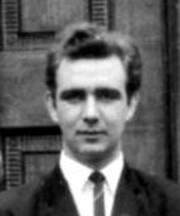
During the Christmas vacation a group of sixth formers - Pauline Ogley, Bancroft, Holmes, Hudson and Thompson from the Upper Sixth, and Gillian Hawcroft, Jean Kilvington from the lower sixth - were fortunate in attending a series of lectures and discussions in the Central Hall, Westminster. This was the twenty-second Christmas holiday lecture to be held in London, and the title of this conference was "Education and Peace". As the conference is organised by the Council for Education in World Citizenship, an organisation of the United Nations, we had several lecturers from UNESCO during the four days of the conference.
Upper Sixth
Lower Sixth
The lectures started at 11 o'clock and at 10-30 the heart of London was resounding to the feet of the three thousand students making their way to the Central Hall. The students came from sixth forms all over the country, many coming from abroad. Thirty American students had even chartered an aeroplane to attend the conference. An opening address was given by Mr. Malcolm Adisechia, Deputy General of UNESCO, and this was followed by our first lecture, "Education and Social Necessity" by Professor J. Lauwerys, from London University. He emphasised that school is not the only place in which education goes on; other groupings - the family, political parties and voluntary organisations all have their role to play. The school however, maintains touch with the lightning changes in events, knowledge and ideas, which is a feature of the present age. The third lecture "Education and Harmony" by Sir John Maud, The Master of University College, Oxford, took place after lunch. For all their respective changes and adjustments, communism and capitalism remain diametrically opposed ideologies. Sir John examined the responsibility that educators had for introducing young people rooted in one ideology to the concepts and practice of the other, and doing so in a sympathetic way. I suppose the best-remembered part of his speech, however, was in offering all the 3,000 students a place at Oxford next year.
At 4 p.m. the discussion groups met for the first time. There were four main groups, with approximately 750 people in each. These groups were obviously sub-divided and each of the sub-groups tackled a question. An example of the type of question is given below - "A project such as the Freedom from Hunger Campaign emphasises the plight of the "have-nots''. Can mutual respect be created out of pity? How can we guard against the educational dangers which may be implicit in this approach?" The first day ended with a dance at St. Pancras Town Hall, which was not too successful but gave the male members of the party an opportunity of meeting some new acquaintances.
On the following day we had lectures from the celebrated Asa Briggs, and Charles Fisher. A panel discussion followed in the afternoon entitled, "The contribution of the Arts", in which many well-known persons participated - Benjamin Britten, Marghanita Laski, Vanessa Redgrave, David Rudkin and Victor Pasmore. An International Concert was given in the Central Hall in the evening, many of the overseas students taking part.
During the third day only two lectures were given, one by Mr. Nigel Calder, editor of the "New Scientist", and Mr. Raymond Durgnat, author and critic. The whole of the afternoon was filled with discussion groups, in which Thompson was unhappily appointed a 'rapporteur', whose job it was to help in drawing up the final report to be presented on the last day.
And so the last day of the conference arrived. Dr. James Henderson, senior lecturer in History of the University of London, and Mr. Lionel Elvin, former head of the education department of UNESCO spoke in the morning. I think I should mention here that at the end of each lecture an opportunity was given for us to go to the microphone and ask questions. It was here that we met something that we had never encountered at Hemsworth - more questions than time. In the afternoon the group reports were presented and a report on CEWC and the World of Tomorrow was given by Mr. Terence Lason. The conference concluded at 4 pm.
On Saturday morning we began our journey back home - the end of a most enjoyable and enlightening week in London. I hope that the people that are fortunate in going to the conference next year will gain as much knowledge and excitement as we did. Although the conference took much of our time we were still able to see many of London's sights.
At 4 p.m. the discussion groups met for the first time. There were four main groups, with approximately 750 people in each. These groups were obviously sub-divided and each of the sub-groups tackled a question. An example of the type of question is given below - "A project such as the Freedom from Hunger Campaign emphasises the plight of the "have-nots''. Can mutual respect be created out of pity? How can we guard against the educational dangers which may be implicit in this approach?" The first day ended with a dance at St. Pancras Town Hall, which was not too successful but gave the male members of the party an opportunity of meeting some new acquaintances.
On the following day we had lectures from the celebrated Asa Briggs, and Charles Fisher. A panel discussion followed in the afternoon entitled, "The contribution of the Arts", in which many well-known persons participated - Benjamin Britten, Marghanita Laski, Vanessa Redgrave, David Rudkin and Victor Pasmore. An International Concert was given in the Central Hall in the evening, many of the overseas students taking part.
During the third day only two lectures were given, one by Mr. Nigel Calder, editor of the "New Scientist", and Mr. Raymond Durgnat, author and critic. The whole of the afternoon was filled with discussion groups, in which Thompson was unhappily appointed a 'rapporteur', whose job it was to help in drawing up the final report to be presented on the last day.
And so the last day of the conference arrived. Dr. James Henderson, senior lecturer in History of the University of London, and Mr. Lionel Elvin, former head of the education department of UNESCO spoke in the morning. I think I should mention here that at the end of each lecture an opportunity was given for us to go to the microphone and ask questions. It was here that we met something that we had never encountered at Hemsworth - more questions than time. In the afternoon the group reports were presented and a report on CEWC and the World of Tomorrow was given by Mr. Terence Lason. The conference concluded at 4 pm.
On Saturday morning we began our journey back home - the end of a most enjoyable and enlightening week in London. I hope that the people that are fortunate in going to the conference next year will gain as much knowledge and excitement as we did. Although the conference took much of our time we were still able to see many of London's sights.
Mr. Hudson
I must of course express our deep thanks to Mr. Hudson for organising the whole trip, and without whose help we would never have been able to go. I would like him to know that the whole group are sincerely grateful to him for making our journey a success. We would also like to thank Holmes for providing the entertainment during our visit, and to the school for paying our coach fare.
Geoff Thompson, U6S
Geoff Thompson, U6S
